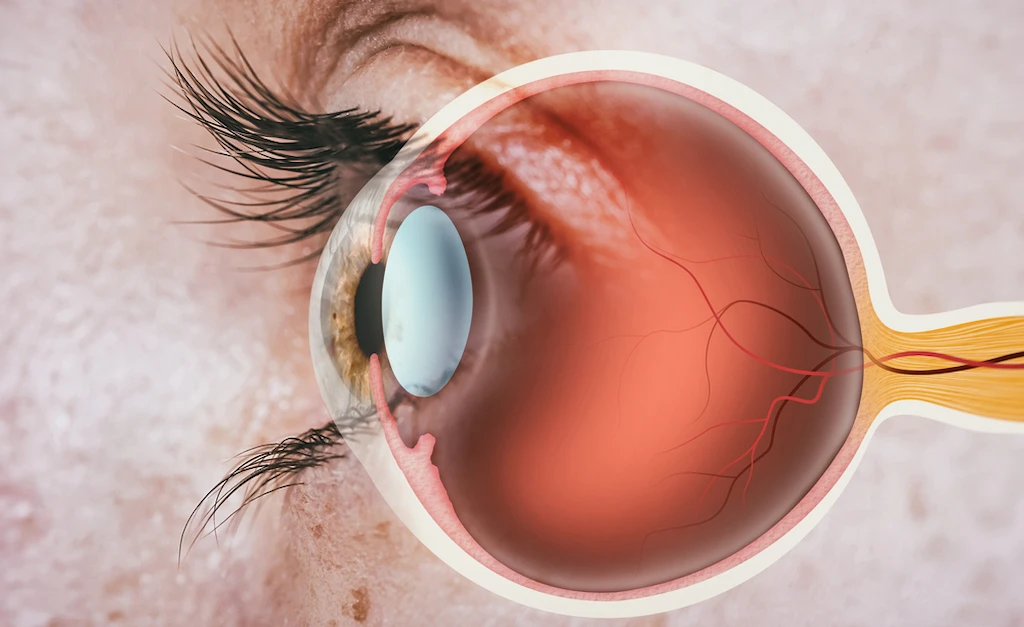


Protecting your vision is the top priority of the Kraff Eye Institute in Chicago IL. If you have Aphakia we will work with you to determine the best treatment.

The term aphakia is the eye condition in which there is no lens in one or both of the eyes. The lens of the eye sits behind the pupil and iris, and focuses the light that comes into your eye and sends the focused image to the retina at the back of the eye. When the lens of the eye is absent, the vision will be blurry. There are several reasons a person may have an aphakic eye. Cataract surgery, and injuries can damage your lens. In rare cases, you can be born without a lens in one or both of the eyes.
Aphakia refers to not having a lens in your eye. Pseudophakia refers to having an intraocular lens placed in the eye; this occurs when the lens is removed during cataract surgery. Cataracts make the natural lens of the eye cloudy, during surgery the cloudy lens is removed and replaced with an intraocular lens.
Aphakia is common, but is most common is people who have surgery to remove their cataracts. There are several signs of aphakia, the symptoms can include:
There are several types of aphakia treatments, your doctor will discuss which option is best suited to your situation, and your lifestyle.
Light Adjustable lens surgery is for the treatment of cataracts. When the natural lens of the eye becomes cloudy, it is removed and replaced with a new intraocular lens.
If you are missing lenses in both your eyes, your doctor may recommend wearing glasses. These glasses are often heavy, may cause you to perceive straight lines as curvy, and may cause problems with depth perception. For these reasons, aphakia glasses are often not the top choice of patients.
Contact lenses for aphakia are very high powered. When utilized for infants, the lenses can be left in for several days at a time, but some will need to be changed daily.
Schedule your chicago aphakia treatment appointment today, to determine the most effective treatment for you or your child. The Kraff Eye Institute is here to help you navigate your aphakia vision, and the management of aphakia.
Schedule Consultation.jpg)

There are several aphakia causes, including cataract surgery, injury, and congenital medical conditions. Let's take a look at each of these causes:
Your doctors at the Kraff Eye Institute will be able to diagnose aphakia during a comprehensive eye exam. During your eye exam the doctor will look at your medical history, and your previous eye history, including any previous surgeries you may have had, this includes cataract surgery. The doctor will also use a slit lamp (a lamp with a microscope) to examine your eyes. This allows the doctor to confirm if you have an eye without a lens, and are indeed aphakic.
Lorem ipsum dolor sit amet, consectetur adipiscing elit. Suspendisse varius enim in eros elementum tristique. Duis cursus, mi quis viverra ornare, eros dolor interdum nulla, ut commodo diam libero vitae erat. Aenean faucibus nibh et justo cursus id rutrum lorem imperdiet. Nunc ut sem vitae risus tristique posuere.

The cost of aphakia treatment in Chicago will vary depending on the treatment that is recommended for you by your doctor.
The Kraff Eye Institute is a proud partner of CareCredit, America's top patient payment program. CareCredit allows you to begin your aphakia treatment immediately, then pay for it at your convenience.
With over 30 years of experience, Dr. Colman Kraff is committed to providing the safest and most effective aphakia treatment options for his patients.
Aphakia can be treated! Schedule an appointment with the Kraff Eye Institute today.
312-757-7335Schedule Consultation

As with any medical condition, aphakia complications can occur, they include:
Retinal tear or detachment: retinal tear or detachment can develop following cataract surgery, or from an injury or trauma to the eye that caused the aphakia.

Unfortunately, there is no way to prevent aphakia, but you can do several things to maintain good eye health. For example you can: